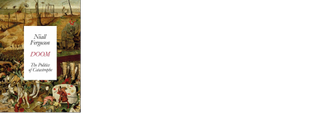Book of the week: Doom
The Scottish-born Harvard historian Niall Ferguson has put the pandemic in the historical context of catastrophes
While the rest of us spent lockdown learning to bake sourdough, Niall Ferguson applied his “prodigious intellect” to the task of placing the pandemic in historical context, said Douglas Alexander in the FT. In Doom, the Scottish-born Harvard historian sets out to “understand why humanity, time and again through the ages, has failed to prepare for catastrophe”.
Ferguson’s inquiry is “dazzlingly broad”, covering a host of natural and man-made disasters – Vesuvius, wars, famine, Chernobyl – and takes in disciplines ranging from network science to epidemiology. Insofar as the book has an “overall thesis”, it is that disasters are usually less the product of poor leadership than of “vulnerabilities of the system”. America’s nearly 600,000 Covid deaths, in other words, probably had less to do with Donald Trump than with the country’s cumbersome bureaucracy. Whether you agree with this or not, Ferguson is a superb historian, and Doom is an “immensely readable” book.
Ferguson has one good reason to claim to be an authority on catastrophes, said David Aaronovitch in The Times: he was quick to grasp the seriousness of Covid-19. In January 2020, as he reminds us on the opening page, he predicted that it would create a global pandemic, and “was regarded as eccentric”. His book, however, is an unconvincing blend of “statements of the readily apparent” and laborious theorising. Was the pandemic a black swan (an unexpected event that catches humanity unawares), a grey rhino (an obviously dangerous event that people nonetheless do nothing about), or a dragon king (an event that flattens civilisation)?
Subscribe to The Week
Escape your echo chamber. Get the facts behind the news, plus analysis from multiple perspectives.

Sign up for The Week's Free Newsletters
From our morning news briefing to a weekly Good News Newsletter, get the best of The Week delivered directly to your inbox.
From our morning news briefing to a weekly Good News Newsletter, get the best of The Week delivered directly to your inbox.
Ferguson says it was a grey rhino. When not playing with such grand concepts, he indulges in tiresome liberal-baiting – describing Black Lives Matter as a “contagion”. Another problem with this book is that it is already outdated, said Mark Whitaker in The Washington Post. Concluding his narrative last autumn, Ferguson predicts the Covid-19 pandemic will be remembered not in the same league as the 1918 Spanish influenza, but rather the (now largely forgotten) Asian flu of 1957. A lot, however, has happened since – including the second wave, the emergence of scary new variants, and the roll-out of vaccines.
Doom is most successful when it sticks to Ferguson’s specialist subject, said Martin Bentham in the London Evening Standard. His accounts of history’s landmark catastrophes are always thought-provoking and well told. They make this a work that many readers will “relish”, even in these “bleak times”.
Allen Lane 496pp £25; The Week Bookshop £19.99

The Week Bookshop
To order this title or any other book in print, visit theweekbookshop.co.uk, or speak to a bookseller on 020-3176 3835. Opening times: Monday to Saturday 9am-5.30pm and Sunday 10am-4pm.
Create an account with the same email registered to your subscription to unlock access.
Sign up for Today's Best Articles in your inbox
A free daily email with the biggest news stories of the day – and the best features from TheWeek.com
-
 'Make legal immigration a more plausible option'
'Make legal immigration a more plausible option'Instant Opinion Opinion, comment and editorials of the day
By Harold Maass, The Week US Published
-
 LA-to-Las Vegas high-speed rail line breaks ground
LA-to-Las Vegas high-speed rail line breaks groundSpeed Read The railway will be ready as soon as 2028
By Peter Weber, The Week US Published
-
 Israel's military intelligence chief resigns
Israel's military intelligence chief resignsSpeed Read Maj. Gen. Aharon Haliva is the first leader to quit for failing to prevent the Hamas attack in October
By Justin Klawans, The Week US Published
-
 The Westbury Hotel review: stunning suites in charming Dublin
The Westbury Hotel review: stunning suites in charming DublinThe Week Recommends This hotel is the perfect spot to while away a weekend in Ireland's capital
By Kaye O'Doherty Published
-
 Drama movies 2024: new films out this year
Drama movies 2024: new films out this yearIn Depth Latest reviews include The Boys in the Boat, One Life and Tchaikovsky's Wife
By The Week UK Last updated
-
 Best new hotels and places to stay in 2024
Best new hotels and places to stay in 2024The Week Recommends Featuring stylish island resorts, historical properties and wilderness retreats
By The Week UK Last updated
-
 Albums of the year: best music of 2023
Albums of the year: best music of 2023The Week Recommends A look back at the best pop, rap, jazz, dance, classical and rock releases
By The Week UK Published
-
 Savoy Grill by Gordon Ramsay review: an institution reinvented
Savoy Grill by Gordon Ramsay review: an institution reinventedThe Week Recommends Traditions are maintained and the tweaks are clever and modern
By Neil Davey Published
-
 Tulum: a Mexican beach town of 'two halves'
Tulum: a Mexican beach town of 'two halves'The Week Recommends With the 'pueblo' and 'Zona Hotelera', Tulum is home to great hotels, restaurants and beach clubs
By William Leigh Published
-
 La Zebra review: beach chic, perfect tacos and secret cenotes
La Zebra review: beach chic, perfect tacos and secret cenotesThe Week Recommends Enjoy a stylish stay in Mexico at this family-friendly beach hotel and restaurant
By William Leigh Published
-
 Atlantis Paradise Island Bahamas review: a mythical beachside resort
Atlantis Paradise Island Bahamas review: a mythical beachside resortThe Week Recommends Combine the classically simple pleasures of sun, sea and sand with upmarket fun and food
By Adrienne Wyper Published